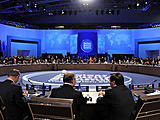Costs of War: NPT Enmity
By Shaun Waterman for ISN
Nearly 190 nations are attending the month-long conference, which opened on Monday and aims to draw up modernizing changes to the NPT, the 40-year-old global treaty underpinning efforts to curb the spread of nuclear weapons and the UN agency that polices them.
Since the Treaty can only be amended by consensus among the signatories, including nuclear pariah Iran, there is little chance of any substantial toughening of the global non-proliferation regime. But the conference may help set the stage for Iran’s growing isolation.
The opening Monday was dominated by a walkout of US, French and British delegates during an address by Iranian President Mahmoud Ahmadinejad, the only head of state attending.
Ahmadinejad charged in his speech that the major nuclear powers - and the US in particular - were seeking to deny emerging nations access to atomic energy under cover of preventing the spread of nuclear weapons.
“One of the gravest injustices committed by nuclear-armed states is equating nuclear weapons with nuclear technology,” he said, external pageaccording to excerpts of his speechcall_made published by the Tehran Times.
“They seek exclusive use of nuclear technology while imposing their will on others and such acts are illegal,” Ahmadinejad said of the five states - the US, Russia, China, Britain and France - who alone under the NPT are allowed to possess nuclear weapons.
The complaint is not a new one. In simple terms, the NPT was originally conceived as a bargain under which the existing nuclear powers would gradually disarm, while other countries agreed to allow their adoption of nuclear technology to be policed by a UN agency - the International Atomic Energy Authority (IAEA) - to prevent the spread of nuclear weapons by ensuring that energy technology was not misused for weapons-related purposes.
The nuclear powers have come under repeated criticism from the other Treaty signatories at the five-yearly NPT review conferences like this one for not disarming swiftly enough - or at all.
But this year, Ahmadinejad’s criticism seems dated.
Perceptions favor US
The Obama administration has made nuclear disarmament, and reducing the threat from nuclear weapons, one of the centerpieces of its foreign policy agenda. The US just signed a new Strategic Arms Reduction Treaty with Russia. And Monday for the first time ever, external pageWashington released figurescall_made on the total size of the US nuclear arsenal – 5,113, roughly in line with previous estimates from arms control specialists.
Perceptions in the international community of the Obama administration - and the priority the president is affording this issue - have clearly worked this week to favor the US, which is seeking to use the conference to help isolate Iran and build support for strengthening the global non-proliferation regime.
UN Secretary General Ban Ki-Moon, for instance, was unusually blunt in his own remarks at the conference Monday, calling on Iran to suspend its uranium enrichment activities and account fully for its past nuclear programs, including any weapons-related research.
"The onus is on Iran to clarify the doubts and concerns about its program," external pagehe saidcall_made.
The remarks by Ban and the UN’s chief nuclear arms watchdog, Yukiya Amano, “constituted an extraordinary rebuke of a head of state in the General Assembly hall,” external pageaccording to the Washington Postcall_made.
The Post went on to note that, “in a rare breach in protocol, Ban left the General Assembly hall for another meeting shortly before Ahmadinejad […] delivered his speech.”
No serious NPT revision likely
However encouraging such optics are, alas, no serious revisions to the NPT are likely to be agreed at the conference, which can only amend the Treaty by consensus.
Instead, US officials tell external pagePolitico’s foreign policy blogger Laura Rozencall_made, they will seek to build “broad consensus for a draft final document that may be blocked by two or three other [signatory nations], but which helps build political momentum that can be followed through in other venues.”
Rozen reports that other US goals include getting more countries to sign on to the additional protocols to the Treaty, boosting the budget of the IAEA, making it harder for countries to unilaterally withdraw from the NPT as North Korea did, and promoting automatic penalties for non-compliance with IAEA safeguards.
The problem, as critics of the UN and the global non-proliferation regime are swift to point out, is that four of the world’s nine nuclear powers - India, Pakistan, Israel and North Korea - are not signatories to the NPT.
The global non-proliferation regime was badly undermined, first in the 1950s and 1960s when the US and France secretly aided Israel’s development of nuclear weapons and later and more comprehensively by the multi-national nuclear smuggling operation masterminded by Pakistani atom scientist AQ Khan.
Now Arab states are circulating draft amendments to the NPT that would ban the transfer of any nuclear-related technology, materials or know-how to Israel.
If the US wants to use the NPT conference as a moral lever to move global opinion against Iran, it will first have to address its own role in undermining the NPT - and confront the reality that Iran is not the only rogue nuclear state in the Middle East.

